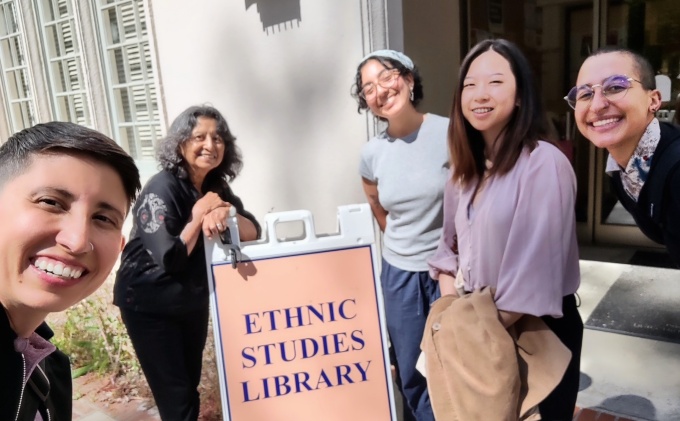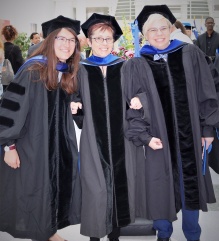PhD in Comparative Literature

Students in the Comparative Literature PhD program at UB can expect to enter into a rigorous and robust graduate community composed of students from a variety of personal and academic backgrounds. Despite the relatively small-size of the program, students currently enrolled at UB engage in a variety historically-grounded and cutting-edge research programs.
Students begin the program with two years of course-work which earn them credits towards an MA in Comparative Literature and prepares them for the more independent and demanding demands of the reading lists and oral examinations before they embark on dissertation writing.
The PhD program prepares students for a wide-range of non-academic careers as well as placement as instructors and professors at post-secondary institutions. The placement record of the program attests to both the reputation of the program as well as the research and teaching skills that students develop at UB. Outside of their coursework and research obligations students may also participate in the departmental GSA, as well as the broader graduate community at UB, including the Just Theory Lecture Series, Theory@Buffalo (an academic journal housed withn the Department of Comparative Literature) as well as the Poetics Program, The Center for the Study of Psychoanalysis and Culture (CSPC), and (PEN)Umbra the journal associated with the CSPC.

Degree Requirements
PhD in Comparative Literature (72 Credits)
30 Credits (10 courses) Intensive (A) Seminars (7 of which must be taught by COL Core Faculty)
Orals Examination (upon completion, students can apply for the MA)
Dissertation (approximately 150-300 pages)
Dissertation Defense
The above information is provided as a guide. Requirements may vary. Please see the Department Director of Graduate Studies, or your advisor for information tailored to your situation.
Academic Requirements
The Comparative Literature department seeks intelligent, highly motivated, and imaginative students with a strong interest in interdisciplinary and theoretical approaches to literature. Application requirements include:
- BA degree or its equivalent
- GRE scores are no longer required
- A critical writing sample
- Three letters of recommendation
Languages
PhD candidates must have:
1. Competency in English and a demonstrated interest in a second language evidenced by completion of additional language courses by the end of the student’s second year.
OR
2. Competency in English and a second language upon entering the program demonstrated by advanced study at the undergraduate or graduate level.
Coursework
Since the department affords a variety of general fields of study, the selection of courses will be determined by the student’s specific area of research. A minimum of ten courses will be required for the PhD Supervised reading courses with individual faculty are not considered in fulfillment of this requirement. At least seven of those courses must be taught by COL faculty. Cross-listed courses do not count toward those seven. The proportion of literary to theoretical and interdisciplinary courses will be determined in consultation with faculty advisers, subject to the approval of the director of graduate studies.
Oral Examination
PhD candidates must complete their oral exam at the latest by December 31 of the fifth semester, and defend their dissertation proposal at the latest by March 31 of the sixth semester. The oral exam is divided into three fields of competence:
- Period
- Genre/Author
- Theoretical approach
In consultation with advisers, students compile three reading lists of no fewer than 20 titles each in their relevant fields of expertise. The completion of orals and the defense of the prospectus are requirements for enrollment in the Dissertation Workshop during the seventh semester, where the primary task is chapter writing.
To adhere to these deadlines, students must complete the ten required intensive seminars by the fourth semester of their study, and begin working on their lists. From these ten intensive seminars, seven must be in COL, which means that they must be taught by one of the following core COL faculty: Professors Gasché, Havis, Irlam, Johnson, Nikolopoulou, Paquette, Pitts, E. Ziarek, and K. Ziarek. Below is the course distribution per semester required to fulfill this timeline:
Dissertation Committee
By the end of the third year of graduate study, students must have established a Dissertation Committee. The Dissertation Committee may be the same as or different from the Qualifying Examination Committee. Students admitted in Fall 2024 and onwards will be required to select their dissertation director from within the COL core faculty
Prospectus:
A prospectus for the dissertation must be written by the end of the third year of graduate study. It should describe the subject and methodology of the dissertation in detail. The dissertation is an original work of scholarship or criticism; its forms and conventions are stipulated in a style sheet provided by the Graduate School.
Dissertation:
The dissertation committee can include faculty members from departments relevant to the student’s research; however, the dissertation director must be a COL faculty member. The dissertation must be read and approved by the three members of the student’s committee. In some occasions, where additional expertise is needed to support a particular project, it is possible to consider an outside reader. Typically, the dissertation defense format is closed to the committee members and the candidate; however, a public defense is an option provided there was a prior consultation between the candidate and the committee members.
Further details can be found in the Graduate Students’ Handbook
Degree Completion Timeline (Full-time PhD)
First Semester
Supported (9 hrs/semester)
First Semester:
1 Orals List
2 Extensive Seminars
Oral exam
Second Semester:
3 Extensive Seminars
Prospectus Defense
(18 credits)
Unsupported (12 hrs/semester)
- 9 hours Supervised Reading (COL 650)**
- Orals Examination
(By March 31)
**3 sections of COL 650 (Supervised Readings) for 3 credits each, with 3 different professors.
IMPORTANT: Let us know if the professor is from another department. We will create a special section**
Second Semester
Supported (9 hrs/semester)
- 9 credit hrs Extensive Seminars
and/or
- Thesis Guidance; Prospectus
18 credit hrs (54 cumulative total)
Unsupported (12 hrs/semester)
- 12 credit hrs Extensive Seminars
and/or
- Thesis Guidance; Prospectus
24 credit hours (72 cumulative total)
Admissions
The deadline for PhD applications is December 15
PhD Program Metrics
Contact
Sameera Abbas, PhD Student, GSA President (2022-2023)
For application and other administrative questions please contact: Gabrielle Young
